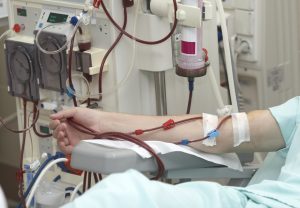 The Centers for Disease Control and Prevention (CDC) have reported 19 hepatitis C cases in 19 dialysis clinics. There were 36 cases of hepatitis C between 2014 and 2015 in 19 dialysis clinics, and nine of those cases were transmitted person-to-person. They report that lapses in infection control procedures are to blame for the rise of hepatitis C cases.
The Centers for Disease Control and Prevention (CDC) have reported 19 hepatitis C cases in 19 dialysis clinics. There were 36 cases of hepatitis C between 2014 and 2015 in 19 dialysis clinics, and nine of those cases were transmitted person-to-person. They report that lapses in infection control procedures are to blame for the rise of hepatitis C cases.
Infection control procedures include injection safety, cleaning and disinfecting, and hand hygiene.
Advertisement
The CDC said the report “underscores the widespread potential for patients to acquire serious infections during dialysis care. [Hepatitis C] transmission can be prevented when proper infection prevention and environmental disinfection practices are consistently followed.”
Hepatitis C infection can cause life-long liver problems, and dialysis is a life-saving treatment for those with kidney problems.
The CDC suggests that facilities need to improve their care for better infection control along with hepatitis C screening.
The CDC has the following recommendations for dialysis patients in order to reduce hepatitis C cases:
- If you do not know whether you have or might have hepatitis C, ask your health care provider.
- Ask your dialysis provider if they follow CDC recommendations, whether you need to be tested for hepatitis C, and what can be done to protect you from hepatitis C infection during dialysis treatment.
- Read educational materials for patients on dialysis safety and hepatitis C.
